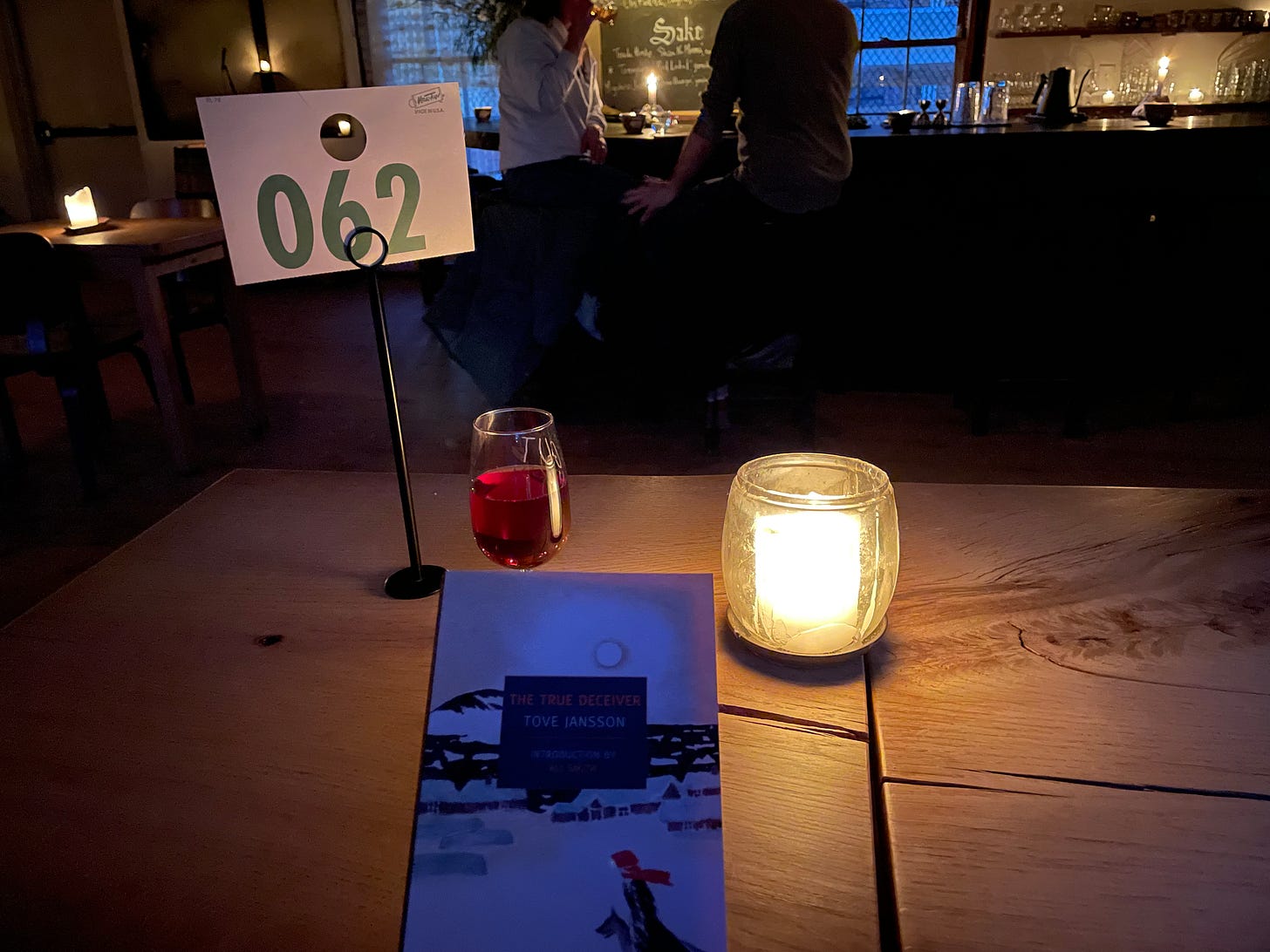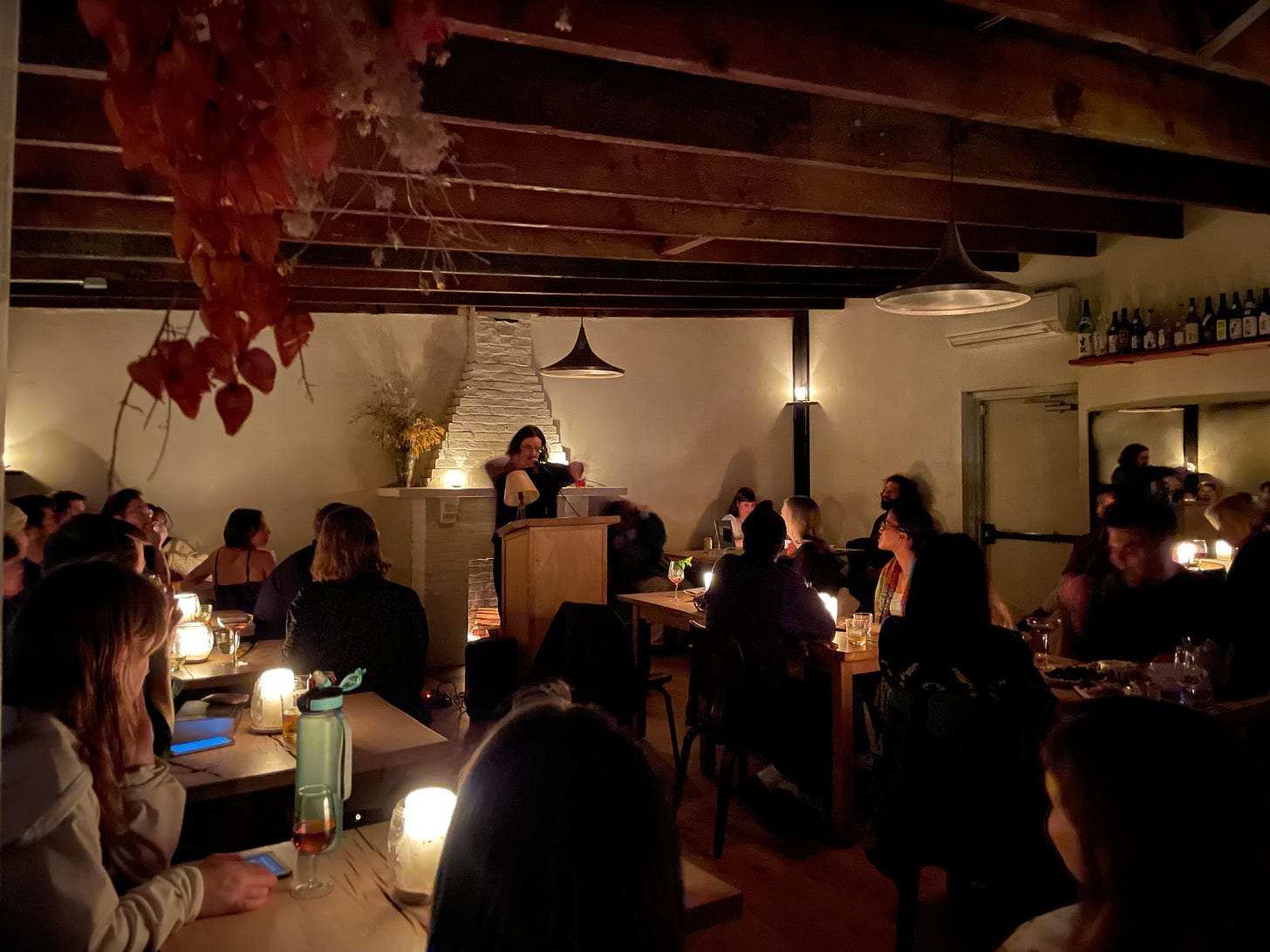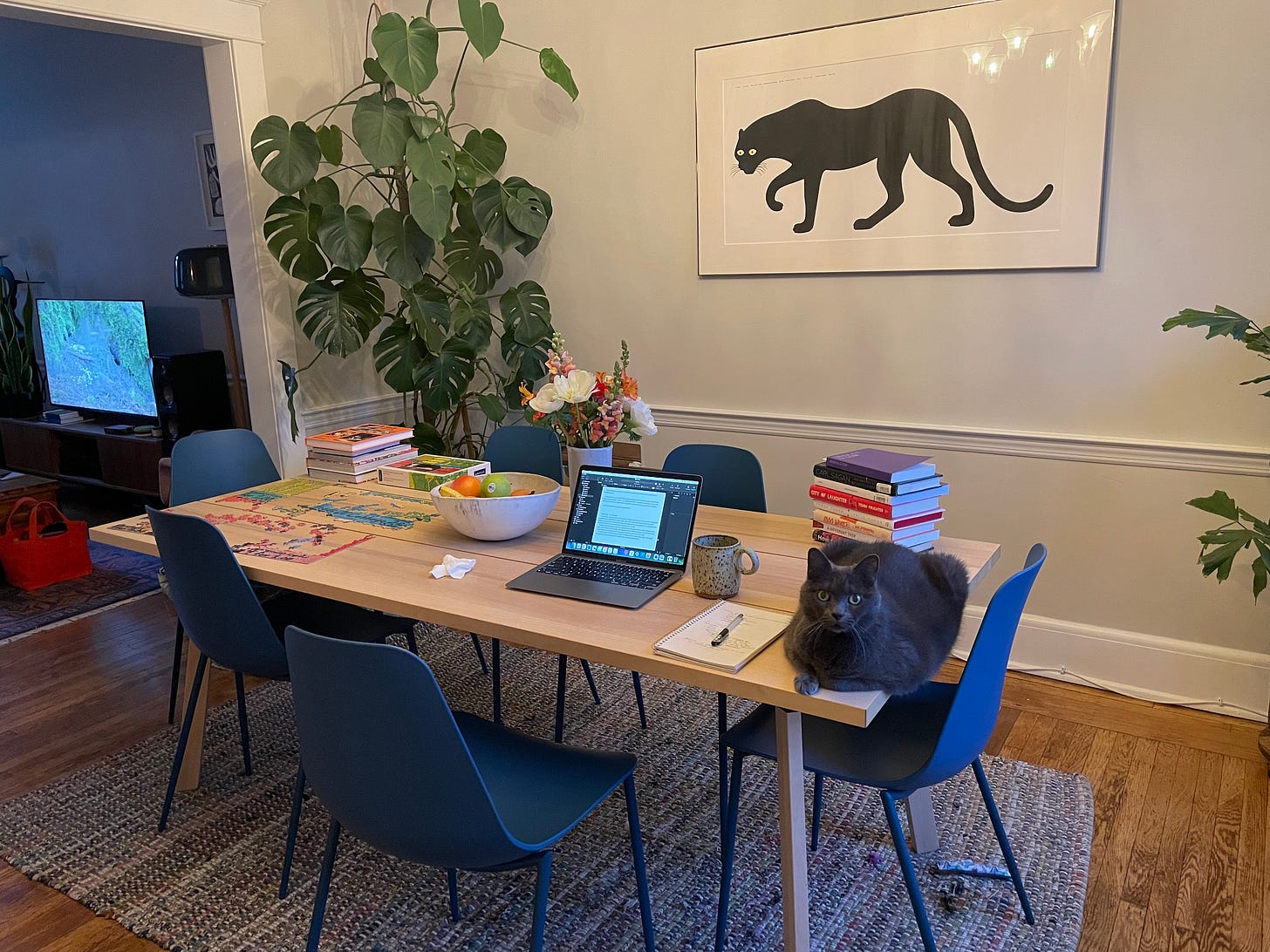On a solo work trip, or when I’m home alone (the former is common, the latter is less so), I like to take myself out for a date with a book. It’s one of the kindest things you can do for yourself as a reader—bringing an otherwise solitary, private activity into a communal space, ordering yourself a meal or a drink, and treating your book as your companion for the evening.

Last week, I met up with two dear friends for a monthly Hidden Palace reading, hosted by my favorite indie bookseller, Greedy Reads, and Baltimore’s favorite natty wine bar, sake bar, and beer garden rolled into one, Fadensonnen. I showed up early, ordered pierogi and french fries from my beloved Chachi’s and a fermented cider that tasted like a Jolly Rancher, and settled in with a wintery book by Tove Jansson.
As simple as a book date is, it feels deeply human and something we don’t do often enough. Find yourself a candlelit cave to be alone while being with others, reading or listening to stories, with phones socked away in a back pocket or bag. Even if it’s just your own dining room after you’ve put your kiddos to bed, light yourself some candles and make a date of it. It doesn’t take much to gift yourself the time and space to experience reading a little differently.
What I’m writing
I sat down to write a few mornings this week. I spent one morning renaming characters who had placeholder names, names that I quickly gave them when writing them into scenes for the first time so as not to slow down my writing session. And it shows—two of my five main characters were subconsciously named after co-workers, oops! Naming them properly feels like getting to know them a little bit more. I also edited a poem I wrote over the summer during a previous “Hidden Palaces” book date.
On the mornings when I did not write, I listened to Saqiyuq: Stories from the Lives of Three Inuit Women, an oral history of Inuit women in the 20th century, compiled by Nancy Wachowich. Even though I’m only an hour into the audiobook, it already feels like an invaluable companion that will help me develop an Inuit character in my story.
I also changed my writing set-up. Instead of writing in my office at the desk I use all day for work, I brought my computer and notebook to the dining table. The morning light is different, the room feels more expansive, and I’m not reminded of work while I’m working. Elvie the cat likes it too :) I also wrote on the train, and wrote at my parents’ dining room table (where I’m writing this now) during a visit. Changing up the view does a good job of shaking up my creativity.
What I read
I finished The Stone Gods by Jeanette Winterson. Now that I’m not in it, I can step back and say that this is a very good book about a lot of Big Ideas that is moderately successful at communicating said Big Ideas. Unfortunately, the plot and characters are often sacrificed at the altar of the Big Ideas, which is a shame.
The book is constructed of four novellas, each of which share the same couple throughout—a government worker and an AI robot, set in a future state on Earth or a planet very much like it. The one exception is the second novella, which is set in a past timeline on Easter Island. I actually found this novella to be the most successful of all four, which was telling; for a futurist, doomer story, the story that was the most simple and stripped down was the most compelling for me as a reader, and I found the relationship between the two characters (no robots included in this version) to be the most affecting.
Should you read it, though? Yes, probably. If you’re interested in climate fiction and AI, and can vibe with a crackling dark sense of humor, you’ll take away quite a bit from this book. The Stone Gods was also published in 2007, several years into the Iraq War, early in Amazon’s growth as a global powerhouse, and the same year the first generation of the iPhone was released. It’s illuminating to see some of Winterson’s anxieties of climate collapse, U.S. hegemony, corporate power, and even World War III creep into her work with the perspective that only time can give a reader. This is another plug for reading about contemporary issues through earlier work!
What I’m reading
Probably too many things, that’s what. I picked up City of Laughter by Temim Fruchter, 1000 Words by Jami Attenberg, The True Deceiver by Tove Jansson, A Different Trek by David Seitz, and Saqiyuq by Nancy Wachowich on audiobook.
I have picked up, started, and put down this entire stack, and then some, within the last two months. I also have three books on hold at the library and other audiobooks in-progress on my Libro.fm app, Libby app, Hoopla app, and Spotify app.
More about my insane reading process another time!
Some helpful things
Three things have supported my writing process this week.
Thing 1: If the writing feels a little stuck, try writing in a different place the next day and see if it feels different.
Thing 2: If you’re trying to better understand a character, immerse yourself in their world for a bit. Listen to the music they might listen to, give them a hobby, and read books about their history or culture. Even better if those books are audiobooks narrated by people of their background who can deliver their language and inflection authentically.
Thing 3: I’m a low-caffeine human these days—usually, one cup of coffee, half decaf, is all I drink for the day. This is one of my health improvements I owe to the pandemic and working from home; in 2020 I became starkly aware of how much coffee I had been consuming each day when I worked in an office (usually 2 cups, full caff, in the morning and a 16 oz. ice coffee or double espresso in the afternoon, wow). Most of the time, I try to save that cup of coffee to have with my breakfast or when I start my workday. But this past week, when I’m trying to re-energize myself to wake up early again to write, a few sips does help. Maybe this seems like a very un-surprising thing for most people, but I also value my soft, dream-state, moldable pre-coffee brain in the morning for writing. Coffee isn’t necessarily better, but it’s a tool that can be used (or not) to affect your writing that day.








https://glocusent.com/collections/amber-book-lights a clip on book light has really enhanced my book dates!